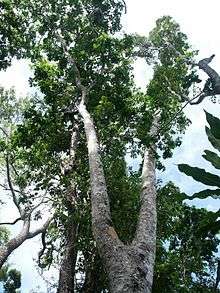Intsia bijuga
| Intsia bijuga | |
|---|---|
 | |
| Scientific classification | |
| Kingdom: | Plantae |
| (unranked): | Angiosperms |
| (unranked): | Eudicots |
| (unranked): | Rosids |
| Order: | Fabales |
| Family: | Fabaceae |
| Genus: | Intsia |
| Species: | I. bijuga |
| Binomial name | |
| Intsia bijuga (Colebr.) Kuntze[2] | |
| Synonyms[2] | |
| |
- This article is about ipil (Intsia bijuga), for the ipil-ipil tree, see Leucaena leucocephala.
Intsia bijuga (commonly known as Borneo teak, Johnstone River teak, Moluccan ironwood, Pacific teak and scrub mahogany[3]) is a species of flowering tree in the pea family, Fabaceae, native to the Indo-Pacific. It ranges from Tanzania and Madagascar east through India and Queensland, Australia to the Pacific islands of Fiji and Samoa.[3] It grows to around 50 metres (160 feet) tall with a highly buttressed trunk. It inhabits mangrove forests.
The tree has a variety of common names including ipil, merbau and kwila.[4] In the Philippines, it also known in some areas as taal.[5]
Uses
The bark and leaves of the ipil are used in traditional medicines. The tree's timber, called merbau or kwila, is a very durable and termite-resistant wood, making it a highly valued material for flooring and other uses. The wood can also be used to extract a dye. Merbau can contain a "gold" fleck that runs through the grain, considered to be attractive by some. Due to extensive logging of the tree, it is endangered in many places in Southeast Asia, and almost extinct in some.[6] Extensive amounts were purchased for the venue of the 2008 Summer Olympics in China, which is the largest importer of the wood.[7] The wood is used for flooring in U.S. and European markets where it is commonly sold under different names. Both licensed and unlicensed mills harvest the wood.
Illegal logging
According to Greenpeace large amounts of ipil timber sourced from illegal logging is being imported into China where there are lax import rules. Greenpeace are targeting users in Western countries in order to halt the trade in ipil wood. Greenpeace claims that at the current rate of logging the tree will be wiped out within 35 years.[7]
In New Zealand, where the ipil wood is known as kwila, attempts have been made to stop it from being imported. In 2008 retailers were divided in whether the sale of kwila should be banned. Jim Anderton, who was the Ministry of Agriculture and Forestry at that time, did not support a ban and instead he left it up to consumer choice.[8]
Symbolism
Ipil is the official tree of the United States territory of Guam.
References
- ↑ "Intsia bijuga". IUCN Red List of Threatened Species. IUCN. 1998: e.T32310A9694485. 1998. doi:10.2305/IUCN.UK.1998.RLTS.T32310A9694485.en. Retrieved 2016-11-15.
- 1 2 "Intsia bijuga". International Legume Database & Information Service (ILDIS). Retrieved 2016-11-15 – via The Plant List.
- 1 2 "Intsia bijuga (Colebr.) Kuntze". Germplasm Resources Information Network. United States Department of Agriculture. 2001-10-18. Retrieved 2010-03-26.
- ↑ "Tree Conservation Information Service". UNEP-WCMC. 2007-09-05. Retrieved 2008-08-23.
- ↑ "Ipil, taal". English, Leo James. Tagalog-English Dictionary. 1990.
- ↑ Wild Singapore
- 1 2 Bristow, Michael (2007-07-06). "China trade threatens tropical trees". BBC.
- ↑ Gibson, Eloise (18 August 2008). "Stores divided over calls to ban kwila". New Zealand Herald. Retrieved 26 June 2010.
Further reading
- Hyland, B. P. M.; Whiffin, T.; Zich, F. A.; et al. (Dec 2010). "Factsheet – Intsia bijuga". Australian Tropical Rainforest Plants. Edition 6.1, online version [RFK 6.1]. Cairns, Australia: Commonwealth Scientific and Industrial Research Organisation (CSIRO), through its Division of Plant Industry; the Centre for Australian National Biodiversity Research; the Australian Tropical Herbarium, James Cook University. Retrieved 16 Mar 2013.
- Sze Pang Cheung; Tiy Chung; Tamara Stark (17 April 2007). "Merbau's Last Stand" (PDF). Greenpeace International, Amsterdam.
- Sihite, Jamartin, (August 2005). Bintuni Bay Nature Reserve Management Plan - Irian Jaya Barat Province 2006-2030 (PDF). The Nature Conservancy. ISBN 979-97700-3-3.
External links
| Wikimedia Commons has media related to Intsia bijuga. |
| Wikispecies has information related to: Intsia bijuga |
- CIRAD Forestry Department - timber data
